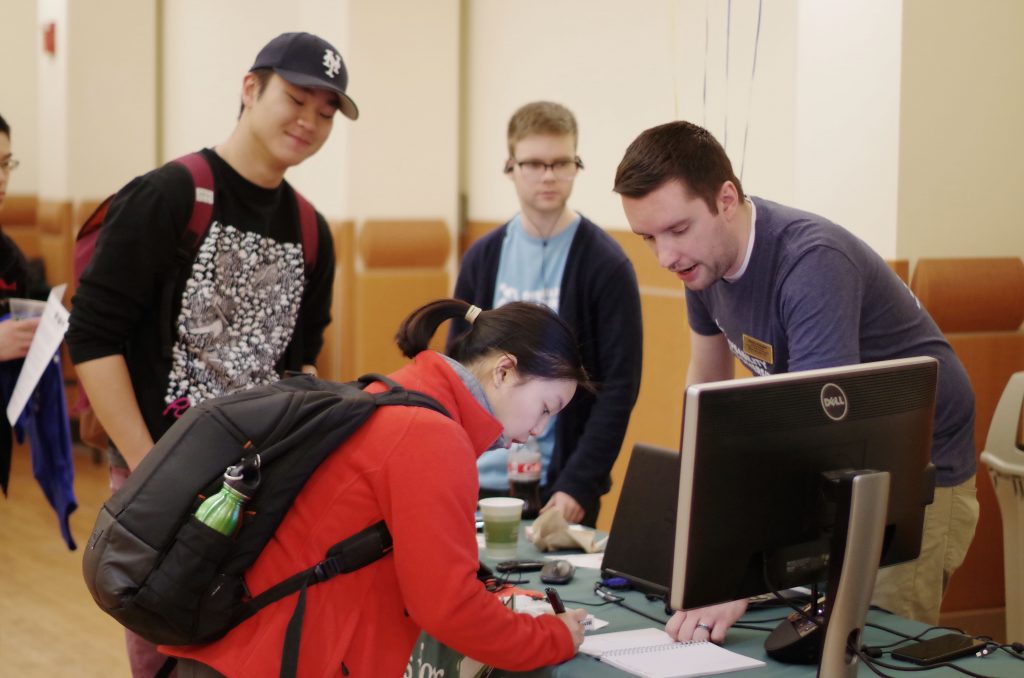
In an effort to raise awareness about different accessibility issues on campus, members of various student groups and Residential Life teamed up for “Disability is Diversity.”
The fair, held on Wednesday in the Mandela Room in the University Union, was organized by residential assistants from several different living communities, along with a variety of student groups, and aimed to educate students about their peers who live with disabilities and the need for accessibility on campus. Additionally, the fair served to highlight the different resources Binghamton University has to offer.
Alison Lin, one of the lead organizers of the event and a senior double-majoring in human development and history, said she wanted to combat the underrepresentation of people with disabilities on campus.
“I felt that it was always left out of the diversity conversation,” Lin wrote in an email. “One night I was talking to my friends and we were talking about how I felt uncomfortable with the idea that so many folks on campus were unaware of the many resources available to us on campus. I wanted to raise awareness of accessibility, not just physical, but also mental, visual, hearing [and] learning.”
Nearly a dozen tables offered students the opportunity to learn more about disabilities and the accommodations people may need. Representatives from a variety of organizations including the Off Campus College Council (OC3), Mental Health Outreach Peer Educators (M-HOPE), Active Minds and Services for Students with Disabilities (SSD) tabled at the event.
According to OC3, most off-campus housing options are not accessible to students with physical disabilities. Some apartments in housing communities such as 20 Hawley Street, Twin River Commons and University Plaza offer wheelchair-accessible entrances and lowered built-in appliances such as counters, but they are still a rarity.
“This topic is important to me because I’ve lived with a physical disability for over ten years,” Lin wrote. “I think it is important for people to realize that disability itself is a culture, and it is one of the largest minority groups in the United States. It is constantly overlooked when people talk about diversity, and I want to change that.”
SSD showcased technology purchased for students who need tools within the classroom, including devices that magnify text for easier reading, headphones that connect via Bluetooth to professors’ microphones, a smart camera that allows virtual attendance for displaced students and smart pens that record audio.
Jeremy Pelletier, assistant director of the SSD, said the administration has been supportive in making accommodations affordable and accessible for students.
“[University President Harvey Stenger] is a huge supporter of our office,” Pelletier said. “Anything that the students need, we go and get it. The students with disabilities don’t pay for anything. The funding comes from the [Student Association] and sometimes from the SUNY foundation.”
According to Kayden Stockwell, a senior double-majoring in psychology and human development, students with autism comprise one of the highest-growing populations of students with disabilities. Stockwell, who has autism, now works at SSD to help students with similar disabilities find their way at BU.
“As students on the spectrum, there aren’t as many services [for students with autism] as there are for physical disabilities, because we’re still figuring out what people need,” Stockwell said. “I wanted to help other students who are on the autism spectrum navigate to adjusting to college, especially socially, because that’s where many of us have our challenges.”
Active Minds and M-HOPE focused on fighting stigmas around mental health and mental illness. Lauryn Maleski, the president of Active Minds and a junior majoring in human development, stressed the importance of educating others on mental health.
“Sometimes disabilities are invisible, and a mental health [disorder] can be an invisible illness, but it doesn’t mean that its impact is disproportionate,” Maleski said.
Danny DelBalzo, a sophomore majoring in biomedical engineering, said he left feeling more informed about the services offered to students with disabilities on campus.
“Although I, myself, don’t have a disability, I was honestly inspired to find out that I go to a university that offers so many great services for students with disabilities,” DelBalzo said.


